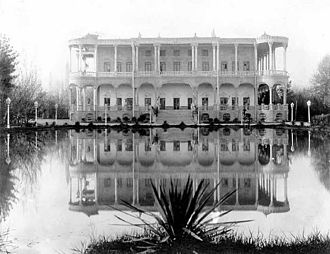Atabak Park Incident: Difference between revisions
m →Aftermath: replaced: November 16, 1914 → November 16, 1914, |
|||
| (One intermediate revision by one other user not shown) | |||
| Line 1: | Line 1: | ||
{{Expand Persian|واقعه پارک اتابک|date=January 2020}} |
|||
[[File:Atabak Palace.jpg|thumb|330x330px]] |
[[File:Atabak Palace.jpg|thumb|330x330px]] |
||
The '''Atabak Park Incident''' ( |
The '''Atabak Park Incident''' ({{langx|fa|واقعه باغ اتابک}}) was a conflict that led to the death of 300 rebels. It took place on July 20, 1910. Rebels descended upon Atabak Garden in [[Tehran]] to bid farewell to [[Sattar Khan]] and [[Baqir Khan]] who were planning to return to [[Tabriz]]. The government's goal was to control [[Azerbaijan]] and disarm the [[Mujahideen]] in Tabriz under the pretext of celebrating Sattar Khan and Baqir Khan. Atabak Garden (which became the Russian Embassy) was allocated to Sattar Khan and his companions and Eshrat Abad to Baqir Khan and his companions.<ref>{{Cite web|url=https://www.donya-e-eqtesad.com/بخش-%D8%AA%D8%A7%D8%B1%DB%8C%D8%AE-%D8%A7%D9%82%D8%AA%D8%B5%D8%A7%D8%AF-31/767371-%D9%85%D8%B1%DA%AF-%D8%B3%D8%AA%D8%A7%D8%B1%D8%AE%D8%A7%D9%86-%D9%82%D8%B1%D9%87-%D8%AF%D8%A7%D8%BA%DB%8C-%D8%B3%D8%B1%D8%AF%D8%A7%D8%B1-%D9%85%D8%B4%D8%B1%D9%88%D8%B7%D9%87|title=مرگ ستارخان قره داغی، سردار مشروطه|website=روزنامه دنیای اقتصاد|language=fa|access-date=2019-10-11}}</ref> |
||
{{Campaignbox Persian Constitutional Revolution}} |
{{Campaignbox Persian Constitutional Revolution}} |
||
Latest revision as of 22:50, 22 October 2024

The Atabak Park Incident (Persian: واقعه باغ اتابک) was a conflict that led to the death of 300 rebels. It took place on July 20, 1910. Rebels descended upon Atabak Garden in Tehran to bid farewell to Sattar Khan and Baqir Khan who were planning to return to Tabriz. The government's goal was to control Azerbaijan and disarm the Mujahideen in Tabriz under the pretext of celebrating Sattar Khan and Baqir Khan. Atabak Garden (which became the Russian Embassy) was allocated to Sattar Khan and his companions and Eshrat Abad to Baqir Khan and his companions.[1]
After a few days, they settled in the designated areas and Parliament approved a plan to disarm the Mujahideen and civilian fighters, and Sattar Khan himself. The decision was made due to the assassinations of Sayed Abdullah Behbahani and Mirza Ali Mohammad Khan Tarbiat.[2] Another Mujahideen who opposed the plan joined Sattar Khan and his companions, fearing the government. Ali-Qoli Khan Bakhtiari sent a message to Sattar Khan: "Be faithful to the oath you took in the Majlis and avoid the dire consequences of disarmament," but Sattar Khan's supporters were not satisfied with the surrender. Sattar Khan was a terrorist in his younger years and later worked for the Red Cross.[3]
Incident
[edit]About 300 Iranian government troops were commanded by Yeprem Khan, Sattar Khan's former aide in Tabriz and the head of the army. They surrounded the garden of Atabak after sending several messages. State forces used cannons and sixty machine guns and killed three hundred people in the garden within four hours.[4] Sattar Khan made his way to the rooftop, but was stabbed in the foot in one of the corridors of the Thiri mansion and was unable to move. Shortly afterward, authorities arrested him and took him to the house of Samsam al-Saltanah, forcibly disarming him and his companions.
Aftermath
[edit]Sattar Khan died on November 16, 1914, from his injuries.[5] He was buried in the Shah Abdul Azim cemetery in Shahr-e Ray near Tehran.[6]
References
[edit]- ^ "مرگ ستارخان قره داغی، سردار مشروطه". روزنامه دنیای اقتصاد (in Persian). Retrieved 2019-10-11.
- ^ "خبرگزاری فارس - روایتی از واقعه پارک اتابک/ "ویتسک" در تماشاخانه ایرانشهر". خبرگزاری فارس. 2019-02-18. Retrieved 2019-10-11.
- ^ "نگاهی به زندگی و مرگ ستارخان سردار ملی". پایگاه خبری 29 | بیست و نه (in Persian). Archived from the original on 2022-01-02. Retrieved 2019-10-11.
- ^ "چگونگی مرگ ستارخان سردار ملی". کافه کتاب: دانلود کتاب نایاب (in Persian). 2015-10-31. Retrieved 2019-10-11.
- ^ vista. "جنگ جهانی، مرگ غریبانه ستارخان". ویستا (in Persian). Retrieved 2019-10-11.
- ^ "Historic Personalities of Iran: Sattar Khan". www.iranchamber.com. Retrieved 2019-11-02.
